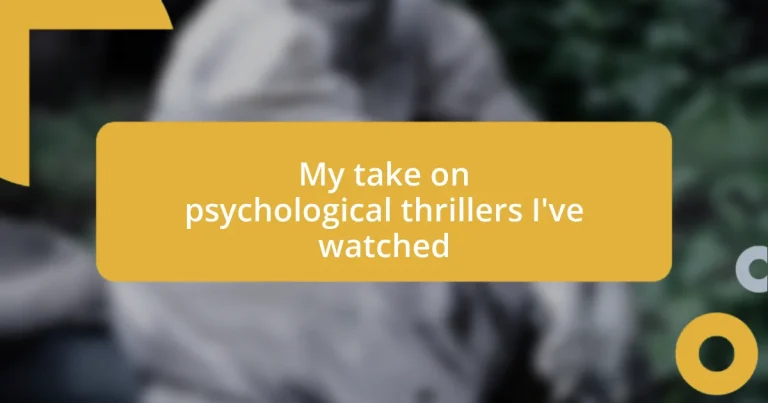Key takeaways:
- Psychological thrillers explore the depths of human emotion and perception, prompting viewers to question their own realities and motivations.
- Key elements in these films include tension building, intricate character development, and atmospheric settings, all of which heighten suspense and emotional engagement.
- Lessons learned from these films emphasize the complexity of identity, the fragility of trust, and the potential for perception to distort reality.
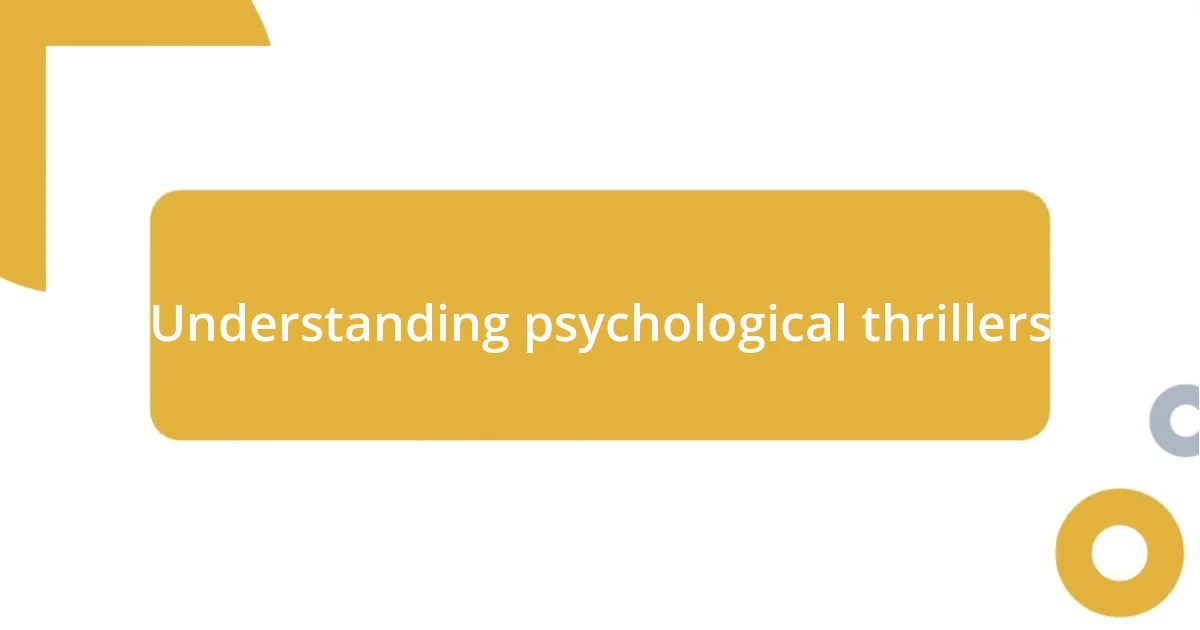
Understanding psychological thrillers
Psychological thrillers are fascinating because they dive deep into the human mind, exploring fears, obsessions, and the blurred lines between reality and illusion. I remember watching “Shutter Island” for the first time; my heart raced as the characters questioned their own sanity. It makes you wonder—how much of our perception can we trust?
What I find captivating about these films is their ability to manipulate emotions, often leaving me questioning my own thoughts long after the credits roll. For instance, “Gone Girl” left me feeling both intrigued and unsettled, as I reflected on the complexities of relationships and deceit. Isn’t it thought-provoking how easily we can be deceived, not just by others, but by our own minds?
Moreover, these thrillers often feature unreliable narrators, which adds a layer of complexity to the storytelling. When I encountered this in “Fight Club,” it was a revelation; I felt a mix of confusion and excitement as I pieced together the truth. Doesn’t it make you reconsider how you interpret narratives in your daily life? It’s like a reflection of our inclination to edit our own realities.
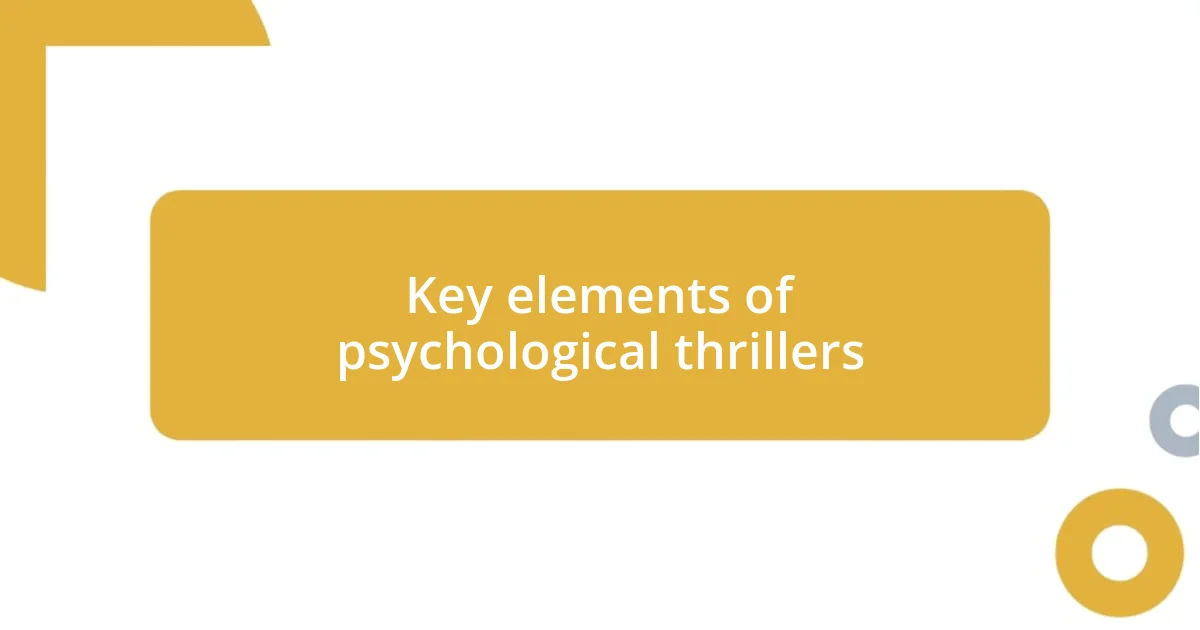
Key elements of psychological thrillers
Psychological thrillers are built on a foundation of tension that keeps viewers on the edge of their seats. One element I find particularly compelling is the exploration of twisted motives. Take “Prisoners,” for example; the desperation of the characters led me to question how far I would go to protect my loved ones. This emotional depth is crucial in making the conflict relatable while also unsettling.
Another key component is the intricate character development, often revealing dark secrets or traumas. I watched “Black Swan” and was struck by the protagonist’s descent into madness—her struggle resonated deeply with me. It’s a stark reminder of how ambition and fear can blur boundaries, leading to a psychological unraveling that mirrors our own vulnerabilities.
To masterfully weave these elements together, the setting plays an integral role, creating an atmosphere that enhances the story’s tension. In “The Sixth Sense,” the dreary, haunting backdrop reflected the characters’ internal struggles vividly, making every twist and turn feel even more impactful. It’s fascinating to observe how these films use every detail to pull you into their world, making you an active participant in the psychological unraveling.
| Key Element | Description |
|---|---|
| Tension Building | Creates suspense that keeps viewers engaged and guessing. |
| Character Development | Reveals deep emotional struggles, making characters relatable and complex. |
| Atmospheric Setting | Enhances tension by reflecting characters’ psychological states. |
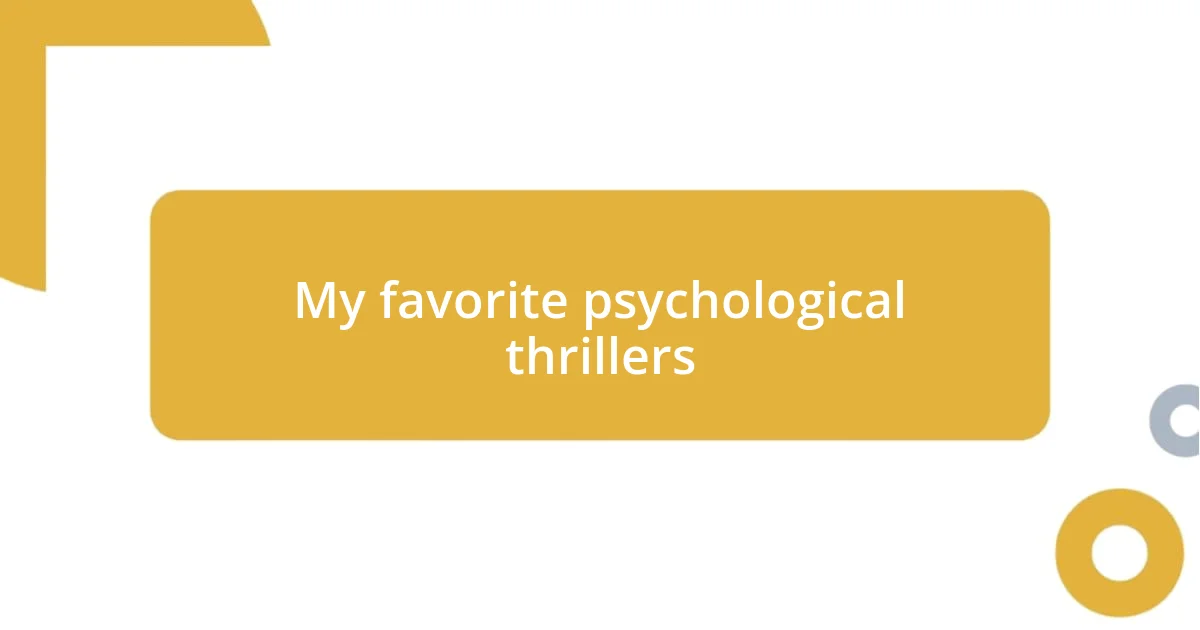
My favorite psychological thrillers
When it comes to my favorite psychological thrillers, a few films have truly left a mark on me. “The Girl on the Train” stands out; its gripping narrative made me reflect on how unreliable our memories can be. I found myself questioning the truth behind each character’s perspective, which led me to ponder on my own experiences and how easily our recollections can shift over time. It’s a stark reminder of the subjective nature of truth and perception in our lives.
Here are some of my other top picks that had a profound impact on me:
- “Se7en”: The chilling atmosphere and shocking ending left me stunned, forcing me to confront the darker sides of human nature.
- “Memento”: The reverse narrative structure was not only captivating but also made me consider how our memories shape our identity.
- “The Others”: The emotional depth and unexpected twists left a lasting impression, pulling me into its haunting world.
Among my favorites, “Zodiac” is a standout not just for its gripping plot but for how it caused me to obsess over details. I spent nights analyzing the film’s clues and piecing together the story, drawing eerie parallels to my own life’s mysteries. Similarly, “Side Effects” resonated deeply; its commentary on mental health and medication made me think about our reliance on pills to navigate complex emotions. Sometimes, I find myself questioning how much of our mind we can understand without external influences weighing us down.
To highlight how these narratives stick with me, here are a few that evoke profound thoughts:
- “Shutter Island”: The mind-bending twists made me reconsider my understanding of sanity and doubt.
- “The Machinist”: The protagonist’s physical and mental decline deeply unsettled me, reflecting the toll that stress and guilt can take on our psyche.
- “Donnie Darko”: This film left me pondering existential questions; I often reflect on its themes long after watching.
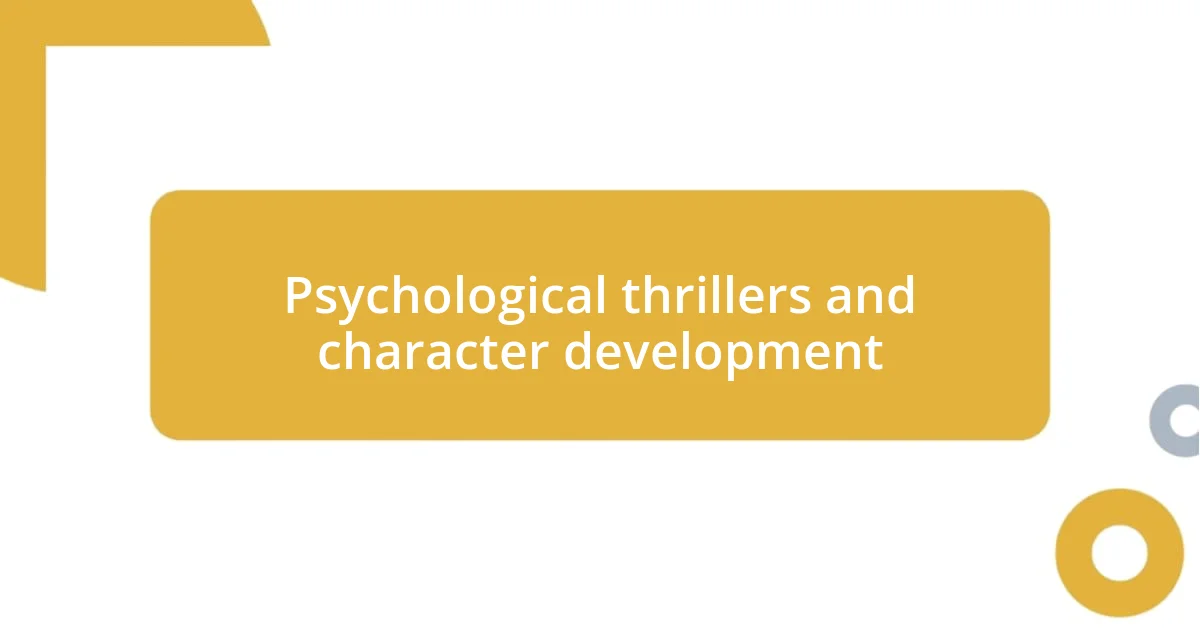
Psychological thrillers and character development
Character development in psychological thrillers is crucial for establishing a deep emotional connection with the audience. I remember watching “Gone Girl” and being utterly fascinated by how both main characters evolved under pressure. The way we delve into their minds reveals not just their motivations, but also their fears and flaws. It makes you wonder, how well do we really know ourselves when faced with challenges?
In films like “Fight Club,” the character arcs are often steeped in layers of complexity. I found myself reflecting on the struggle for identity that the protagonist faced. It’s a brilliant depiction of how societal pressures can lead individuals down a dark path, challenging our beliefs about masculinity and consumerism. Isn’t it intriguing how characters can mirror our own internal battles, often showing us sides of ourselves we may not want to acknowledge?
Additionally, the process of peeling back the layers of a character’s psyche allows the audience to engage on a personal level. For instance, in “The Babadook,” I was moved by the protagonist’s grief and how it manifested into something monstrous. It struck me that our own emotional struggles can feel similarly suffocating and lead us to dark places. It made me think: could these characters be reflections of our hidden fears, urging us to confront what lies beneath the surface?
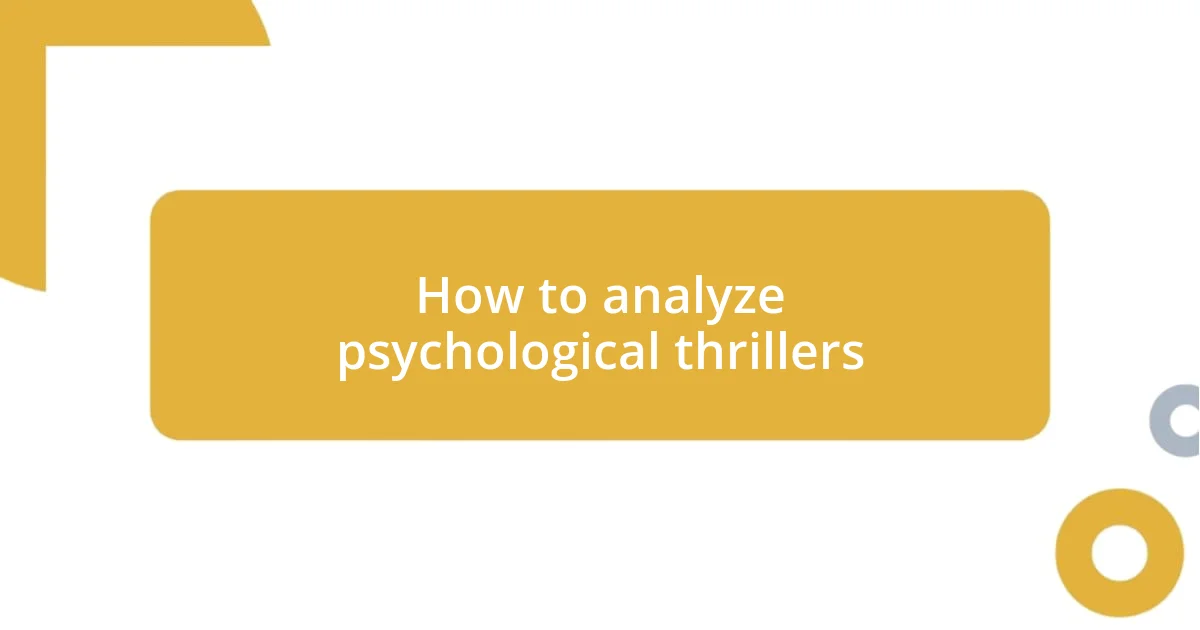
How to analyze psychological thrillers
Analyzing psychological thrillers begins with understanding the themes at play. I recall watching “Black Swan” and being captivated by the duality of ambition and madness. When I deconstructed the film, it dawned on me how these themes can reflect our own struggles, making us question where our ambitions might lead us. Isn’t it fascinating how a film can so starkly mirror our own experiences or fears?
Next, pay close attention to the character motivations. In “Prisoners,” I remember feeling an overwhelming sense of empathy for the father’s desperation. Analyzing his choices helped me recognize the moral complexities presented in the film. It made me ponder: how far would I go to protect my loved ones? This engages not just our minds, but often stirs deep emotional responses that resonate long after the credits roll.
Lastly, the narrative structure plays a critical role in developing suspense and tension. After watching “The Sixth Sense,” I found myself replaying key scenes in my head, searching for clues I might have missed. The twist at the end completely redefined my understanding of the story. Analyzing the film taught me how the manipulation of time and perspective can create layers of meaning. It’s incredible how revisiting these elements can enhance our appreciation of the craft behind these gripping tales.
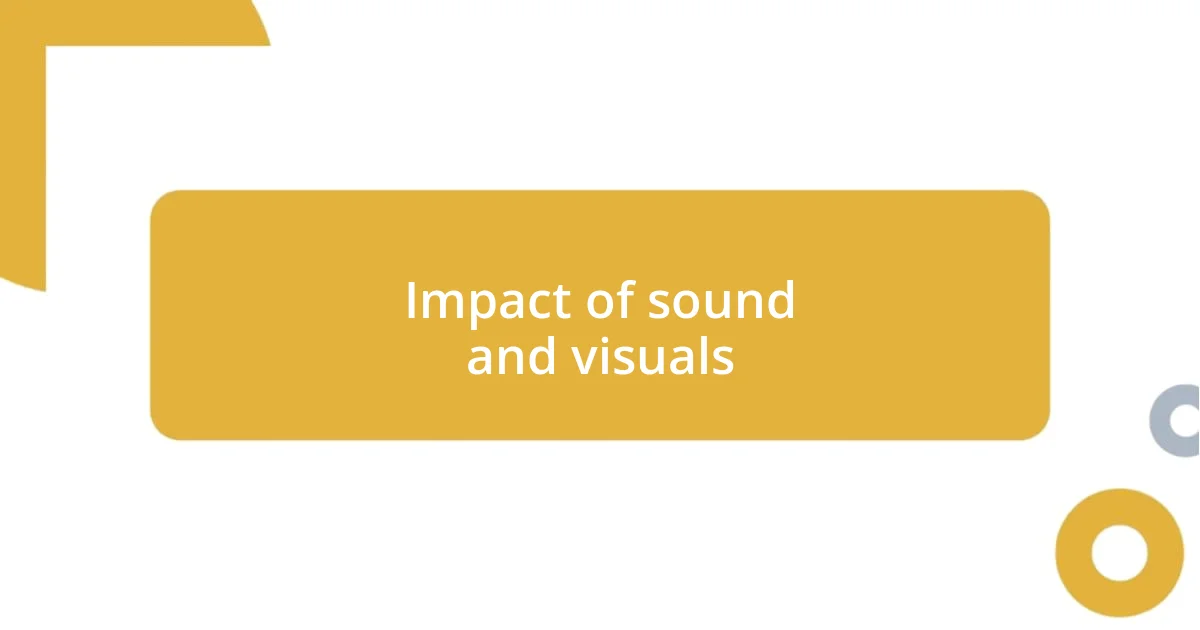
Impact of sound and visuals
The impact of sound and visuals in psychological thrillers cannot be overstated. I often find that the haunting scores create an atmosphere that pulls me into the film’s emotional landscape. For instance, the chilling soundtrack of “Hereditary” resonated with a tension that lingered long after the credits rolled. Doesn’t it make you feel uneasy when a single note can set the mood for an entire scene?
When it comes to visuals, I remember being captivated by the stark juxtaposition of light and shadow in “Se7en.” Each frame felt carefully constructed to elicit a visceral reaction. This connection between what we see and how we feel is remarkable. I’ve often wondered how much of our psychological state is influenced by the visual storytelling in films. It’s fascinating how specific color palettes or unsettling camera angles can evoke such strong emotional responses, making us question our own perceptions of reality.
Moreover, the synergy between sound and visuals can profoundly enhance a narrative. During a tense moment in “Midsommar,” the bright, vibrant visuals created a dissonance with the ominous events unfolding. This juxtaposition not only heightened my anxiety but also left me pondering how beauty can often mask darkness. Have you ever noticed how a seemingly serene scene can take a sudden, unsettling turn, making you reflect on the duality of human emotions? It’s this interplay that keeps me yearning for more when watching psychological thrillers.
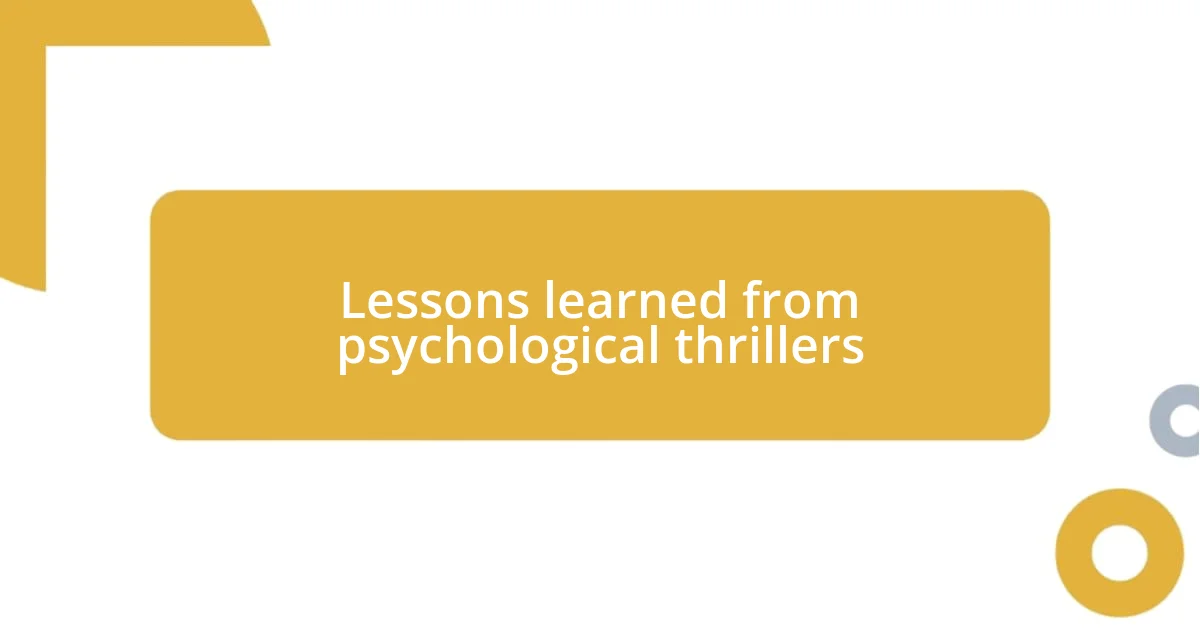
Lessons learned from psychological thrillers
I’ve realized that one of the most striking lessons from psychological thrillers is the complexity of the human psyche. Watching “Fight Club,” I was captivated by the exploration of identity and self-destruction. It made me reflect: how well do we truly know ourselves? This film illustrates how our internal battles can manifest in ways we might not expect, prompting a deeper examination of our own motivations and desires.
Another significant takeaway is the exploration of trust and betrayal. During my viewing of “Gone Girl,” I found myself questioning the reliability of the characters and their relationships. It left me pondering the nature of trust in our own lives—how fragile it can be and how easily it can be manipulated. This film, in particular, taught me to be more aware of the hidden narratives people might be weaving around us.
Finally, psychological thrillers often remind me that perception can be dangerously misleading. After watching “Shutter Island,” I learned that what seems obvious on the surface might not be the full story. As I reflected on the movie’s shocking twists, I started to consider how our own biases can cloud our judgments in real life. Isn’t it intriguing how our perceptions shape our reality, and how often we need to question what we think we know?












